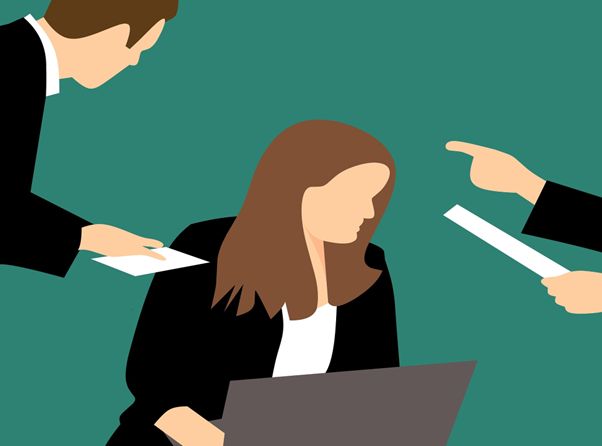Sexism and Gender Discrimination – 2 Interviews
by Laura Bastianini (2004) Liceo Sesto Properzio, Assisi/Italy on 2023-05-29

The following article was written by Laura Bastianini (2004), Liceo Sesto Properzio di Assisi/Italy, and Giulia Valente (2004), Liceo Sesto Properzio di Assisi/Italy,
as part of the trait d`union online workshop “The fight against discrimination and the discussion on how to” between editors from Liceo Sesto Properzio di Assisi/Italy and Gisela-Gymnasium Munich/Germany in March 2022.
We would like to thank pixabay for the use of the photo.
Sexism and Gender Discrimination – 2 Interviews
In the following interviews, we want to show the point of view of a teacher and a lawyer, who expressed their opinions, very different, interesting and sometimes contradictory, on the subject.
1) What parts of your life would be easier if you were a man?
● Of course, work. I’d have a better salary, better chances and people would take me seriously. I would stand in front of a coffee machine without being considered frivolous or chatterbox. I probably wouldn’t have to accomplish my boss laughing at his disgusting jokes. Moreover, social and family life would be much easier if I were a man. Can you believe that “female” razors cost more than “male” razors? Or that pads are taxed? Can you imagine how much I could have saved on my everyday groceries, just if I were a man?
● Private life for sure! Women with a social position are demanding, they have high expectations, they know exactly what they want, therefore this frightens and makes men uncomfortable. On the other hand, a man with a social position tends to be admired and desired.
2) Is it a good idea to decide a certain percentage of Parliament that should be filled by women?
● Yes, of course it is. People, especially men, think that being a woman isn’t suitable to cover a leading role in politics. But as far as I can see, being a man or a woman doesn’t make someone a good politician.
● It could be a good idea, even if it should be a temporary moment, from my point of view. People should be elected to Parliament by merit, not because they are men or women. Although, a period of break-in with quotas for women could be helpful to establish a gender equality, as for Apartheid in South Africa with racial laws, but then women or men shouldn’t be guaranteed an employment if they do not deserve it.
3) Has gender equality already been reached? Do we still need feminism?
● Is this a joke? Absolutely no, we are definitely light years away from gender equality.
● Legally yes, but in fact still not completely.
4) Do you feel social pressure to behave a certain way because of your gender? If yes, from whom or what experience does this pressure mostly come?
● Yes. I feel a lot of social pressure in behaving “like a lady”. It basically comes from my parents’ education: they always told me to behave nicely, to be feminine and to comply with other women in society. To sum up, I had to enter the role of woman conceived by society. When I grew up, literally everyone asked me why I still was unmarried or didn’t have children. It often happens that, when I enter a bar or a concert hall, people stare at me. And I look back at them, instead of feeling embarrassed. Because I’m doing nothing bad, so they just have to understand that I depend on nobody but myself. I have to admit that I am the first person to put myself under social pressure, feeling like I’m not beautiful or attractive enough for a man. But this is because of our society: women are trained to be like men want them to be. We are constantly objectified; our body parts are just a sexual instrument. If you think about it, men don’t have to cover their breasts, but we have to!
● Honestly no, I don’t feel any social pressure because of my gender. I rather feel it for my age. A young woman in career is taken less seriously by her colleagues, both men and women. Not always there is the female solidarity that is expected.
5) Have you ever been in a situation where you or another person has been discriminated because of their gender? What was the situation like?
● Yes, I have, unfortunately. During a lot of job interviews, I had to answer extremely private questions, like if I was married, if I had children or if I wanted to… Once I said I had an hysterectomy to make them feel bad. I saw my interlocutors become extremely uncomfortable and I perceived their embarrassment. Of course, they didn’t give me the job. Indeed, after a few minutes, I realized it wasn’t good to say something like that, because there are people who really did this kind of surgery. But it is the proof that men don’t consider us at the same level of them, especially if we have some physical or physiological “flaw”. Thinking about it, during university, one of my male professors told me I had to be better than my male colleagues in human sciences, just because I am a woman.
· Luckily, I’ve never been discriminated for being a woman. Probably because my profession, for a long time now, is no longer male dominated.
Sessismo e discriminazione di genere – 2 interviste
Con le seguenti interviste, vogliamo mostrare il punto di vista di un’insegnante e di un avvocato, le quali hanno espresso le loro opinioni, molto diverse, interessanti e talvolta contrastanti, riguardo l’argomento trattato.
1 Quale parte della tua vita sarebbe più facile se fossi un uomo?
· Di certo, il lavoro. Avrei uno stipendio migliore, maggiori possibilità e la gente mi prenderebbe sul serio. Mi metterei davanti a una macchina del caffè senza essere considerata frivola o chiacchierona. Probabilmente non dovrei compiacere il mio capo ridendo alle sue battute disgustose. Inoltre, la vita sociale e familiare sarebbe molto più facile se fossi un uomo. Ci credi che i rasoi "femminili" costano più dei rasoi "maschili"? O che gli assorbenti sono tassati? Puoi immaginare quanto avrei potuto risparmiare sulla mia spesa quotidiana, solo se fossi stata un uomo?
· La vita privata! Le donne con una posizione sociale sono impegnative, con aspettative, sanno quello che vogliono e questo impaurisce e mette a disagio il genere maschile e lo fa allontanare. L’uomo impegnativo, con una posizione sociale tende al contrario ad essere ammirato e conteso.
2 È una buona idea stabilire una certa percentuale del Parlamento che dovrebbe essere occupata da donne?
· Sì, certo che lo è. Le persone, specialmente gli uomini, pensano che una donna non sia adatta a ricoprire un ruolo di primo piano in politica. Ma a quanto vedo, essere un uomo o una donna non rende qualcuno un buon politico.
· Sarebbe una buona idea, anche se a mio avviso dovrebbe essere un momento transitorio. In parlamento ci si dovrebbe arrivare per meriti, non perché uomo o perché donna. Tuttavia, un periodo di rodaggio con quote rosa potrebbe essere utile per fissare una parità di genere, come per l’apartheid in Sudafrica, con le leggi razziali, però poi non si deve garantire un numero di posti alle donne o agli uomini se non lo meritano.
3 L`uguaglianza di genere è già stata raggiunta? Abbiamo ancora bisogno del femminismo?
· È uno scherzo? Assolutamente no, siamo decisamente lontani anni luce dall`uguaglianza di genere.
· Legalmente sì, ma di fatto ancora non completamente.
4 Senti la pressione sociale di doverti comportare in un certo modo a causa del tuo genere? Se sì, da chi o quale esperienza proviene principalmente questa pressione?
· Sì. Sento molta pressione sociale nel comportarmi "come una signora". Fondamentalmente viene dall`educazione dei miei genitori: mi hanno sempre detto di comportarmi bene, di essere femminile e di rispettare le altre donne nella società. In sintesi, ho dovuto entrare nel ruolo della donna concepito dalla società. Quando sono cresciuta, letteralmente tutti mi hanno chiesto perché non ero ancora sposata o non avevo figli. Capita spesso che, quando entro in un bar o vado ad un concerto, la gente mi guardi male. E io ricambio, invece di sentirmi in imbarazzo. Perché non sto facendo niente di male, quindi devono capire che dipendo solo da me stessa. Devo ammettere che sono la prima persona a mettermi sotto pressione, sentendomi come se non fossi abbastanza bella o attraente per un uomo. Ma questo è dovuto alla nostra società: le donne sono addestrate ad essere come gli uomini vogliono che siano. Siamo costantemente oggettivate, le nostre parti del corpo sono solo uno strumento sessuale. Se ci pensi, gli uomini non devono coprirsi il seno, ma noi dobbiamo!
· Onestamente no, non sento la pressione sociale per il mio genere, piuttosto per l’età. Una ragazza giovane in carriera viene presa meno seriamente da colleghi, sia uomini che donne. Non sempre c’è la solidarietà femminile che ci si aspetta.
5 Sei mai stata in una situazione in cui tu o un`altra persona siete state discriminate a causa del vostro genere? Qual era la situazione?
· Sì, mi è successo, purtroppo. Durante un sacco di colloqui di lavoro, ho dovuto rispondere a domande estremamente private, come ad esempio se fossi sposata, se avessi figli o se ne volessi... Una volta ho detto che avevo subito un`isterectomia per farli sentire in imbarazzo. Ho visto i miei interlocutori diventare estremamente impacciati e ho percepito il loro imbarazzo. Ovviamente, non mi hanno dato il lavoro. Infatti, dopo pochi minuti, ho capito che non era bene dire cose del genere, perché ci sono persone che hanno davvero fatto questo tipo di intervento. Ma è la prova che gli uomini non ci considerano al loro stesso livello, soprattutto se abbiamo qualche "difetto" fisico o fisiologico. Pensandoci, durante l`università, uno dei miei professori mi disse che dovevo essere migliore dei miei colleghi maschi nelle scienze umane, solo perché sono una donna.
Per fortuna non sono stata discriminata perché sono una donna. Probabilmente perché la mia professione, da molto tempo ormai, non è più prevalentemente maschile.



